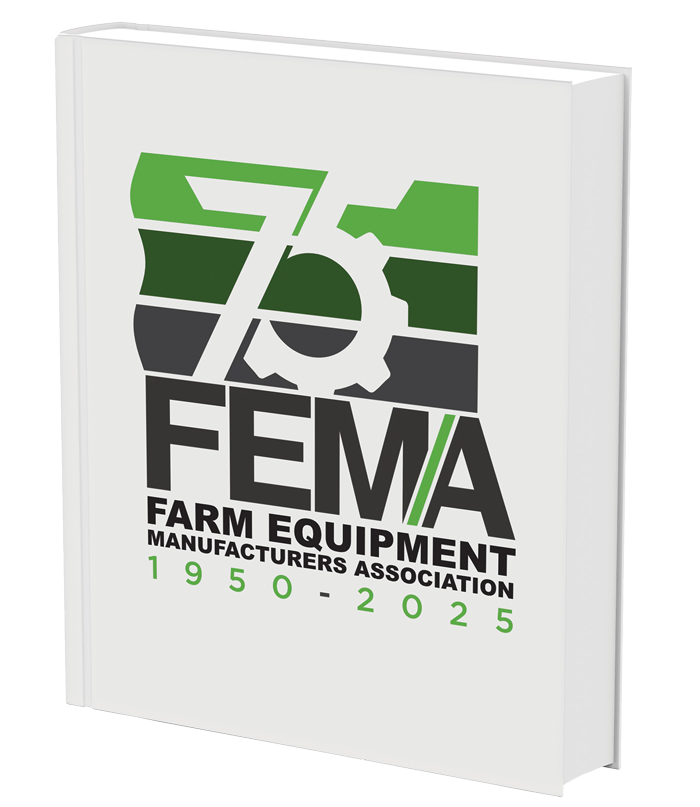Editor's Note: FEMA is collaborating with Lessiter Media, publisher of Farm Equipment magazine, to commemorate their 75-year history. As part of the FEMA anniversary, we're asking the question: "What would be the industry impact had FEMA never come to exist or perhaps failed to find traction and permanence?" Send your answer to this question to mlessiter@lessitermedia.com and your response may appear on Farm-Equipment.com.
The aim of the Farm Equipment Manufacturers Assn. (FEMA) is to promote the vitality of shortline manufacturers within the U.S. and Canadian agricultural equipment markets.
These manufacturers have long been an integral part of the industry and provided many specialty products that, over the years, became mainstays for many farm equipment dealers and their customers.
Most of these manufacturers were small compared to the major tractor manufacturers and were regional in their marketing efforts. Through their association with other manufacturers within the FEMA organization, they began to realize that there might be a national market for their products — and that allowed for significant growth within those companies.
My First Encounter & CP Nicholson
My first encounter with FEMA came in the mid-1970s when C.P. (Nick) Nicholson was one of its most active members. Nick was Vice President of Sales for Athens Plow in Athens, Tenn., which our company purchased, and he served as President of FEMA in 1968 – 1969. He promoted FEMA’s services to anyone who would listen. FEMA’s New Member Recruitment Program Award is named in his honor.
In the early 1990s, an industry friend advised me that FEMA was having a meeting to discuss dealer contracts and that I should be there. After checking with my company, I found that we had no representative at FEMA -- and suddenly I was it.
At that meeting, I found that FEMA was an important organization for our marketing efforts and so began more than a decade of my working with this fine organization.

In the midst of celebrating its 75th Anniversary, the Farm Equipment Manufacturers Association (FEMA) has partnered with Lessiter Media to chronicle the Association’s past through an in-depth multimedia project that will culminate at FEMA’s Marketing & Distribution Convention in Las Vegas, NV., on Oct. 27-30, 2025. Key pieces of this special collaboration include a comprehensive history book (pictured right) on the association that highlights the significance of the organization and its independent shortline members and their innovations. The media group will also film, edit and produce a video documentary that will entertain, educate and inspire the industry about the accomplishments and mission of FEMA. Both projects will debut to attendees at the 2025 Fall Convention, and later to the entire industry through Lessiter Media’s ag division properties.
Dealer Relations Efforts
At this first meeting, which was attended by the lead attorney for Case IH, I began to become aware of the importance of FEMA. Ironically, this attorney was shocked to learn that most dealers produced more sales volume than did the average FEMA member company.
As a result of this meeting, I soon found myself a member of the Dealer Relations Committee and then became Vice Chair and, within 2 years, was Chair of that committee. I later served as a member of the FEMA Board of Directors.
The Dealer Relations committee not only produced a Model Dealers Agreement, but we later also produced FEMA’s Model Warranty program, worked on many of the legislative campaigns that featured Dealer By-Back Laws in various states and generally served to help maintain a strong relationship with shortline manufacturers and the dealer networks that sold their products.
FEMA’s Impact
FEMA was not only a boon for manufacturers but for distributors and independent sales representatives who helped to market the members’ products. Many of the members marketed their lines exclusively through distributors and independent representatives across the country. Many of those initial relationships began at the FEMA Spring or Fall Convention.
Another group was the suppliers of components that many of the manufacturers utilized in their production efforts, such as basic steel products, driveline components and other technically difficult components to manufacture. FEMA would often help provide an additional discount for those products.
The Spring Meeting offered a trade show in which the manufacturers and these suppliers could interact, and many of these were first-time meetings. As manufacturers developed new products, their need for unique components would be fulfilled by the suppliers at these shows.
Still another group, industry associates, such as Farm Equipment magazine, realized an access to industry leaders within the scope of manufacturers represented by FEMA. FEMA’s association with insurance companies also provided competitively priced insurance products for both the manufacturers and distributors/independent sale representatives who were also FEMA members.
The Big What-If Question...
What if FEMA did not exist?
The opportunity to grow for many of these smaller, specialty manufacturers would be especially curtailed without FEMA. The opportunity to learn the inner secrets of a successful business is on display at each meeting of FEMA and its absence would be a major loss for the member companies.
Distributors and independent representatives would face a far more difficult time reaching potential marketing partners and the cost of establishing such relationships would skyrocket for both the manufacturer and the independent sales organizations.
The ease with which component manufacturers can now present their line of products to a wide array of specialty manufacturers would not exist. Many of the smaller manufacturers would find it difficult to attract the attention of those suppliers and would pay a much higher price for their products.
Industry associated companies would experience an increase in the cost of finding information and supplying their services to this group of potential clients without the benefit of FEMA membership.
FEMA has been, and will continue to be, a vital link in the U.S. and Canadian ag equipment markets and without such an organization those markets would lag in new product development and introduction.
Had FEMA failed to launch, all areas of the industry today would have faced incredible challenges.

Read more from Reflecting on 75 Years of the Farm Equipment Manufacturers Association
Join the Conversation! Email your answer to the question: "What would be the industry impact had FEMA never come to exist or perhaps failed to find traction and permanence?" to mlessiter@lessitermedia.com.






